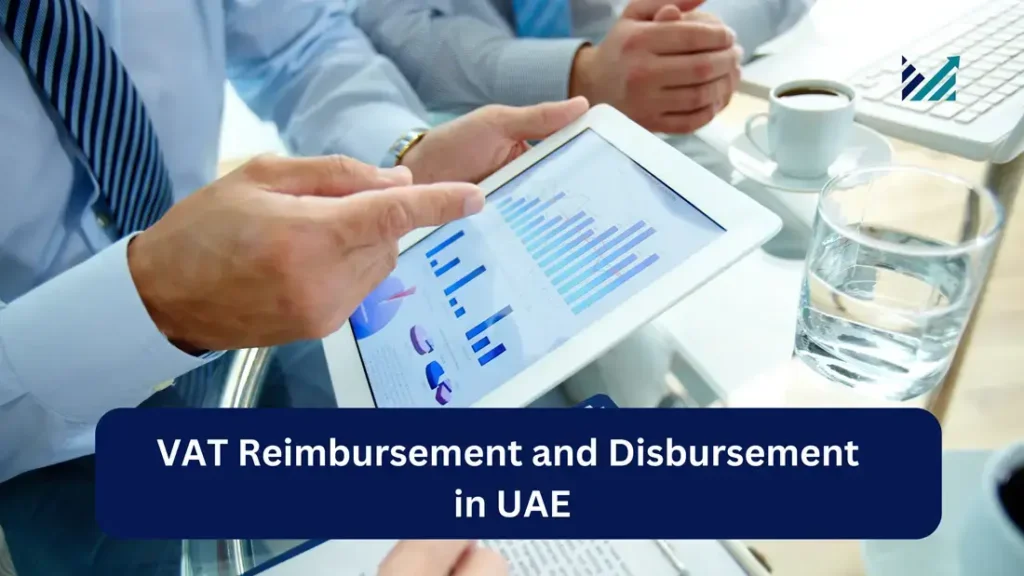
Value Added Tax (VAT) became part of the UAE tax system in 2018. It affects both businesses and individuals, making it important for everyone to understand. Two key parts of VAT are reimbursement and disbursement. These help manage tax payments and ensure compliance.
Simply put, VAT reimbursement lets businesses and individuals recover VAT paid on business costs. VAT disbursement is about getting back exact amounts spent for clients, without extra VAT added.
If you own a business or qualify for a VAT refund in the UAE, understanding these processes is critical. This guide walk you through VAT reimbursement and disbursement so you can manage them easily and stay compliant.
VAT Reimbursement in UAE
VAT reimbursement lets businesses and individuals claim back VAT paid on expenses. This applies when VAT isn’t recoverable as input tax or when there’s an input tax surplus.
Who Can Claim VAT Reimbursement
You may qualify for a VAT refund if you are:
- Businesses: Companies registered for VAT that paid VAT on things like office rent, supplies, or services.
- Tourists: Visitors to the UAE buying goods from VAT-registered shops and claiming refunds when leaving.
- Government Bodies and Diplomats: Some can claim VAT refunds on UAE purchases.
- Foreign Businesses: Companies with no UAE presence may reclaim VAT on eligible UAE expenses.
General Requirements:
- VAT must be paid on business-related costs.
- You must be VAT-registered with an active number.
- Submit claims on time with invoices, receipts, and documents.
Common Reasons for VAT Reimbursement
VAT reimbursement often happens in these cases:
- Business Purchases: Companies claim VAT on costs like rent, utilities, marketing, or equipment.
- Tourist Refunds: Tourists reclaim VAT on goods from registered stores when leaving the UAE.
- Events and Conferences: Businesses can reclaim VAT on event fees and related services.
- Cross-border Trade: Companies importing or exporting can reclaim VAT under FTA rules.
- Overpaid VAT: Businesses can claim refunds if they paid more VAT than collected.
How to Claim VAT Reimbursement in UAE
- Register on the FTA Portal: Businesses must have an active FTA account. Tourists use refund points at airports.
- Prepare Documents: Collect your tax registration, VAT returns, purchase and sales invoices, and bank statements.
- Submit the Claim: Log into the FTA portal, complete the refund form, and upload documents.
- FTA Review: The FTA checks your claim. They may ask for extra details.
- Get Your Refund: Once approved, you get your refund through a bank transfer or other methods.
VAT Disbursement in UAE
VAT disbursement is when a business recovers an exact amount spent on behalf of a client. The amount recovered must match the amount paid, without markup.
Important:
- Reimbursements are different from disbursements.
- Reimbursements usually involve VAT.
- Disbursements usually don’t.
Key Points of VAT Disbursement
- Exact Match: You recover exactly what you paid.
- No VAT: Disbursements don’t attract VAT.
To Qualify as a Disbursement:
- The expense must be for the client’s direct benefit.
- The recovery must be the same as the amount paid.
- No goods or services must be supplied as part of it.
- Input VAT on such expenses can’t be recovered.
Example of VAT Disbursement
Airspace Marketing arranges a photoshoot for client Movers Enterprises.
- Paid to Photographer: AED 1,050 (AED 1,000 base + AED 50 VAT)
- Airspace recovers exactly AED 1,050 from Movers Enterprises.
- No extra VAT is charged during recovery.
Difference Between VAT Reimbursement Disbursement
| Aspect | VAT Disbursement | VAT Reimbursement |
|---|---|---|
| Nature | Recovering exact client expenses, no markup. | Claiming VAT back on business expenses. |
| VAT Impact | No VAT added. | VAT portion claimed back. |
| Example | Business pays AED 1,050 for client and recovers same. | Business buys supplies for AED 1,000 + AED 50 VAT and claims VAT back from FTA. |
Related: How to Calculate VAT in UAE?
How to Comply with UAE VAT Laws?
To ensure compliance with UAE VAT laws:
- Identify and Document Expenses: Keep all invoices, receipts, and relevant records.
- Determine VAT Treatment: Classify the expense as standard-rated, zero-rated, exempt, or out of scope.
- Review Contracts: Ensure that agreements clearly define VAT implications for reimbursements and disbursements.
- Consult Tax Experts: Get professional advice from top audit and accounting companies in UAE to determine correct VAT treatment for cost recharges.
VAT Reimbursement and Disbursement – FAQs
Why is it important to understand the difference between reimbursements and disbursements in VAT reporting?
Understanding the difference is crucial because reimbursements are subject to VAT, while disbursements may be outside the scope. Incorrect classification can lead to penalties or incorrect VAT filings.
How does the ownership of goods impact the principles of reimbursement?
Ownership determines VAT treatment. If the supplier invoices you directly and you later recover the cost, it is a reimbursement. If you are simply paying on behalf of another entity, it is a disbursement.
Can a reimbursable expense ever be exempt from VAT in the UAE?
Yes, if the reimbursed expense falls under VAT-exempt categories, such as:
- Certain financial services
- Residential property leases
- Local passenger transport
What steps should businesses take to comply with UAE VAT laws for disbursements?
To comply with VAT laws:
- Document expenses accurately.
- Classify the VAT treatment correctly.
- Ensure contracts address VAT implications.
- Seek professional tax guidance.
Are there specific industries where disbursement is more common than reimbursement?
Yes, industries such as consulting, legal services, and marketing agencies deal with more disbursements than reimbursements. These businesses often pay expenses on behalf of clients and pass them on without adding VAT.
Understanding VAT treatment of reimbursements and disbursements ensures businesses comply with UAE tax regulations and avoid penalties.

